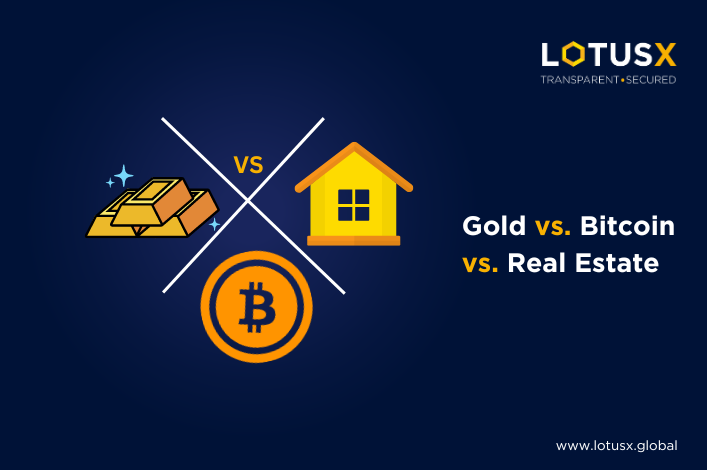In today’s ever-evolving financial landscape, investors constantly seek the best assets to grow and protect their wealth. Among the many options available, three asset classes are perennial favorites: Bitcoin, Gold, and Real Estate. Each asset has unique characteristics and benefits, making them worthy contenders in the ultimate asset showdown. In this blog, we’ll delve into the strengths and weaknesses of these assets to help you make informed investment decisions.
Introduction
When it comes to investing, there are a variety of assets to choose from. Some of the most popular include stocks, bonds, and real estate. But in recent years, two new asset classes have emerged as serious contenders: cryptocurrency and gold.
So, which is the best investment? Bitcoin, gold, or real estate?
Understanding Economic Uncertainties
When inflation becomes an issue, the government must cut spending or raise interest rates. Both would have the same impact of slowing the economy. Such rules will function in an ideal macroenvironment because they slow things down when things are fast and moving.
The issue is that inflation gradually reduces customers’ purchasing power. The increasing cost of borrowing money also discourages enterprises from growing, reducing chances for further expansion. As interest rates rise, investors must weigh the risks of risk-on and risk-off assets.
What category do Bitcoin, gold, and real estate come into? These are valuable assets based on their pricing. Bitcoin is gaining popularity due to its potential as a new store of value, among other things. Gold has always been valued and has continually increased in value. Real estate has always been in high demand since it is more than just a commodity with good returns.
Cryptocurrency: Bitcoin
Bitcoin has emerged as a disruptive force in the financial world. It’s a decentralized financial wizard with the potential for massive returns. Bitcoin supporters and investors refer to the asset as digital gold. BTC is considered an excellent store of value, inflation hedge, haven asset, direct peer-to-peer (P2P) payment mechanism, and frictionless value movement. It possesses monetary and value asset qualities, allowing it to serve several functions. It is entirely digital, developed on blockchain technology, a computer code, and requires a device to operate. Here’s a closer look:

High Growth Potential: Cryptocurrencies have witnessed extraordinary growth over the past decade. Bitcoin, for instance, has delivered staggering returns, outperforming traditional assets.
Accessibility: Cryptos are easily accessible, with trading platforms available 24/7. Anyone with an internet connection can participate.
Decentralization: The absence of centralized authorities means greater user control and privacy.
Combat Inflation: Cryptocurrencies are often touted as a hedge against inflation and a store of value. They are also seen as a way to invest in new technology and innovation.
Gold
Gold is the most valuable metal in human history. Gold has been prized in ornaments, jewelry, and as a medium of exchange in trade since ancient times. Even holy literature mentions gold as a valuable and desirable thing with a high monetary value. It is rare and difficult to manufacture, requiring extensive resources to extract and process. Gold has been a store of value for millennia and is often seen as a haven asset. It has a track record of preserving wealth during economic downturns. Let’s have a closer look at the characteristics:
Historical Store of Value: Gold has maintained its value for centuries, making it a reliable asset for preserving wealth. It is often seen as an object identified as a wealth or status symbol.
Portfolio Diversification: Gold is a hedge against inflation and economic instability, making it an excellent addition to a diversified portfolio. BTC, too, is being considered as a hedge against inflation now.
Liquidity: Gold is a highly liquid asset with a global market that operates 24/7. However, due to its weight and tangibility, it is not easy to carry around or sell. In contrast, Cryptocurrencies like BTC are digital investments, highly liquid, and easy to sell with just a click.
Compounding Increase in Value: Gold is a rare metal that has given a massive run-up over the years. It is often believed that gold, whenever bought, is its best rate. BTC is no different to that.
Real Estate
Real estate investments involve purchasing physical properties like residential, commercial, or rental properties. Real estate investments are tangible assets whose value has increased manifolds over time. With the rising demand for housing and development, this demand for real estate is surging. Those with land for development or property to rent or sell benefit most. It is often considered a compounding asset, which inherently increases in value while generating a passive income for you in the form of rent.
Real estate is a key measure of an economy’s health. When the property market booms, the value of real estate rises. The demand and price of real estate have a direct relationship, meaning as the demand increases, the price also increases. A booming market may be a great time to sell, but if your financial situation allows, it is better to hold the asset and wait for the prices to increase due to inflation.

Steady Income: Rental properties provide a consistent source of income through rent payments. However, one needs enormous capital or loans to generate that passive revenue.
Appreciation: Real estate has historically appreciated, offering potential capital gains over time. But bear in mind that in these past couple of years, real estate has not been on a positive trend, leaving property owners with either no rental income or a substantial increase in value.
Tangible Asset: Real estate provides a tangible asset that can be leveraged for various purposes, including loans and collateral. With that being said, it accounts for one of the cons of real estate investments, as they are highly illiquid with longer selling time and paperwork,
Management and Maintenance: Property ownership includes maintenance, repairs, and property management responsibilities. Added costs can be a bummer if the property is not generating income during market downturns.
So, which is the best investment?
The answer depends on your circumstances and risk tolerance. Gold may be a good option if you want a haven asset to hold its value during economic turmoil. Cryptocurrency may be a better choice if you are looking for an asset with the potential for high returns. Real estate may be the best option if you want an asset that can provide a steady income stream.
Ultimately, the best way to decide which asset is right for you is to research and understand your financial situation. Here are some additional factors to consider when choosing between cryptocurrency, gold, and real estate:
- Liquidity: How easy is it to buy and sell the asset?
- Volatility: How much does the asset’s price fluctuate?
- Risk: How likely will you lose money on the investment?
- Return potential: How much money do you have the potential to make on the investment?
- Your investment goals: What are you hoping to achieve with your investment?
Once you have considered these factors, you can start narrowing down your choices and choose the right asset.




